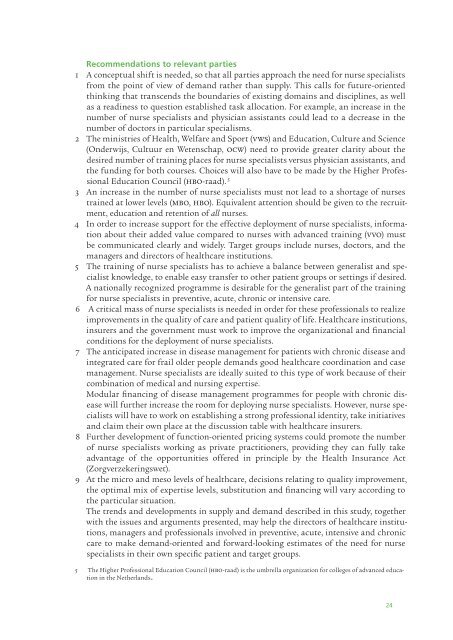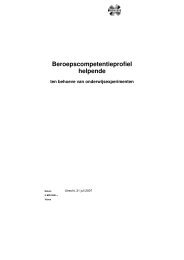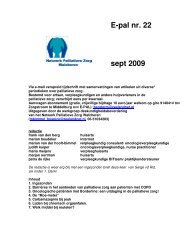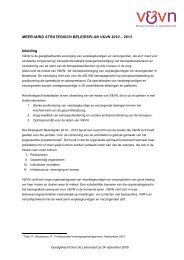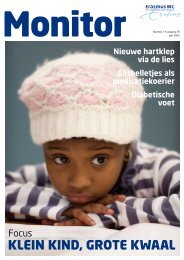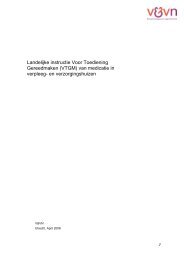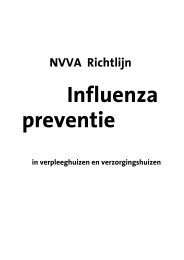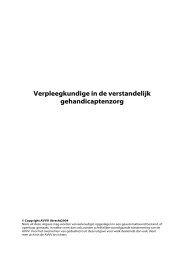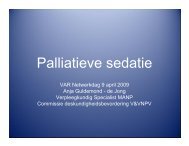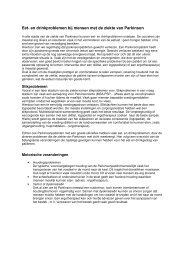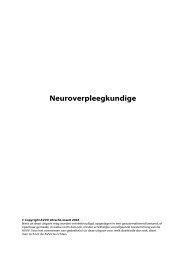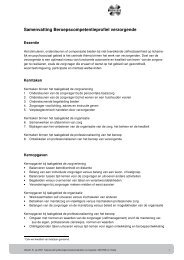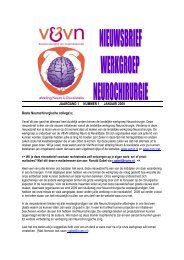Toekomstige behoefte verpleegkundig specialisten bij somatische ...
Toekomstige behoefte verpleegkundig specialisten bij somatische ...
Toekomstige behoefte verpleegkundig specialisten bij somatische ...
You also want an ePaper? Increase the reach of your titles
YUMPU automatically turns print PDFs into web optimized ePapers that Google loves.
Recommendations to relevant parties<br />
1 A conceptual shift is needed, so that all parties approach the need for nurse specialists<br />
from the point of view of demand rather than supply. This calls for future-oriented<br />
thinking that transcends the boundaries of existing domains and disciplines, as well<br />
as a readiness to question established task allocation. For example, an increase in the<br />
number of nurse specialists and physician assistants could lead to a decrease in the<br />
number of doctors in particular specialisms.<br />
2 The ministries of Health, Welfare and Sport (vws) and Education, Culture and Science<br />
(Onderwijs, Cultuur en Wetenschap, ocw) need to provide greater clarity about the<br />
desired number of training places for nurse specialists versus physician assistants, and<br />
the funding for both courses. Choices will also have to be made by the Higher Professional<br />
Education Council (hbo-raad). 5<br />
3 An increase in the number of nurse specialists must not lead to a shortage of nurses<br />
trained at lower levels (mbo, hbo). Equivalent attention should be given to the recruitment,<br />
education and retention of all nurses.<br />
4 In order to increase support for the effective deployment of nurse specialists, information<br />
about their added value compared to nurses with advanced training (vvo) must<br />
be communicated clearly and widely. Target groups include nurses, doctors, and the<br />
managers and directors of healthcare institutions.<br />
5 The training of nurse specialists has to achieve a balance between generalist and specialist<br />
knowledge, to enable easy transfer to other patient groups or settings if desired.<br />
A nationally recognized programme is desirable for the generalist part of the training<br />
for nurse specialists in preventive, acute, chronic or intensive care.<br />
6 A critical mass of nurse specialists is needed in order for these professionals to realize<br />
improvements in the quality of care and patient quality of life. Healthcare institutions,<br />
insurers and the government must work to improve the organizational and financial<br />
conditions for the deployment of nurse specialists.<br />
7 The anticipated increase in disease management for patients with chronic disease and<br />
integrated care for frail older people demands good healthcare coordination and case<br />
management. Nurse specialists are ideally suited to this type of work because of their<br />
combination of medical and nursing expertise.<br />
Modular financing of disease management programmes for people with chronic disease<br />
will further increase the room for deploying nurse specialists. However, nurse specialists<br />
will have to work on establishing a strong professional identity, take initiatives<br />
and claim their own place at the discussion table with healthcare insurers.<br />
8 Further development of function-oriented pricing systems could promote the number<br />
of nurse specialists working as private practitioners, providing they can fully take<br />
advantage of the opportunities offered in principle by the Health Insurance Act<br />
(Zorgverzekeringswet).<br />
9 At the micro and meso levels of healthcare, decisions relating to quality improvement,<br />
the optimal mix of expertise levels, substitution and financing will vary according to<br />
the particular situation.<br />
The trends and developments in supply and demand described in this study, together<br />
with the issues and arguments presented, may help the directors of healthcare institutions,<br />
managers and professionals involved in preventive, acute, intensive and chronic<br />
care to make demand-oriented and forward-looking estimates of the need for nurse<br />
specialists in their own specific patient and target groups.<br />
5 The Higher Professional Education Council (hbo-raad) is the umbrella organization for colleges of advanced education<br />
in the Netherlands.<br />
24


